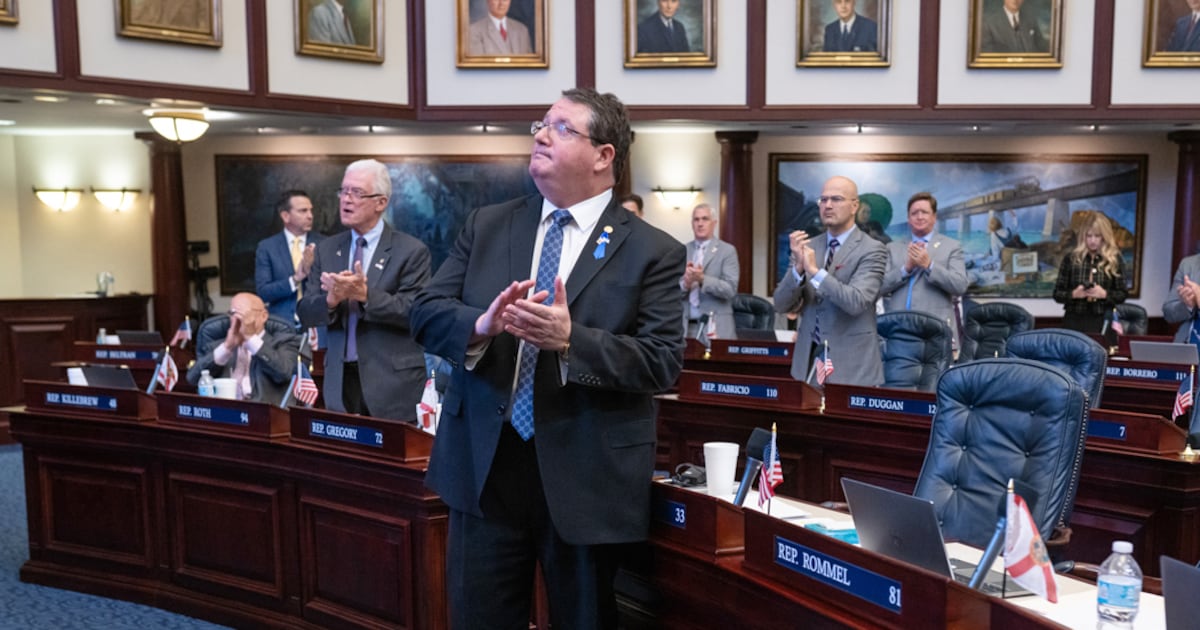So, Richard Trumka, how worried are you about the inroads Donald Trump made into your membership, and a future in which an anti-free trade Republican Party makes significant inroads into the union vote?
I sat with the AFL-CIO president recently in his office just up the street from the White House to talk about the impact its current occupant is having on the union’s steadily shrinking but still formidable membership of 12 million workers. Trump got 36 percent of his members’ votes against Hillary Clinton. That’s only three points more than Mitt Romney, but three points isn’t nothing in a close election. And as Trumka emphasized to me, it wasn’t only or even chiefly that Trump did better than Romney. Clinton, he wanted me to know, did worse than Obama—10 points worse, snaring just 55 percent of his rank-and-file’s vote. The rest went third party or sat it out.
So is he worried that Trump can bust up the traditional Democratic-labor marriage? “Actually less each day,” he tells me. “The Wall Street wing of his administration is hijacking his agenda.” We spoke before the White House’s announcement Wednesday that it was going to rethink NAFTA, so that has probably placated Trumka somewhat. But he pointed to Trump’s about-face on China and currency manipulation and the fact that the president hasn’t talked up infrastructure in a very long time as discouraging signs.
ADVERTISEMENT
His posture toward Trump is not one of total opposition. He’s skeptical and suspicious, certainly. In addition to thinking Trump has gone Wall Street as president, Trumka fears that Trump will gut labor safety regulations and thinks he probably can’t bring jobs back to the coal fields in huge numbers. That said, he’s mindful of the fact that Trump spoke compellingly to a portion of his rank and file, so he’s keeping a semi-open mind. “We’re just telling [members] every day what he’s doing to help them or hurt them,” he says. “If he does something to help ’em I say it. If he does something to hurt ’em I say it. They can decide for themselves who’s friend and who’s foe.”
We spent more of our 50 minutes together talking about the Democrats than we did about Trump. He didn’t want to lay into Hillary Clinton personally, but he did point out to me that fact about her doing less well among his members than Obama had, and he had some sharp words for the Democratic message in last year’s campaign—and for Bill Clinton.
“The Democratic Party quite frankly had no coherent economic message,” he said. “Workers have been facing stagnant wages, dropping benefits, and economic security being taken away from them over a 40-year period. Trump said a lot of stuff—hasn’t followed through on it, but said it, and they were willing to take a chance.”
The problems, he said, started under Bill Clinton. “I think that was the beginning of the schizophrenic days, when they needed workers’ votes but wanted Wall Street money, so they tried to serve two masters but were successful at neither,” says Trumka.
But didn’t Bill Clinton do a number of good things? I mean, 22 million jobs?
“People still weren’t getting wage increases,” he says. “The economy was still moving away from us.”
And what of Barack Obama?
Slight pause, then: “A well-intentioned guy. I think he had a good heart. You have to put him in context. He had a Congress determined not to let him do anything. They spooked him early on… It’s not like he had a fair chance on the playing field. He could have done more workers, but all in all, he tried.”
Not exactly high praise (he also mentioned his disappointment that Obama didn’t speak more consistently about—or do more to fight—wage stagnation and inequality). So surely, President Trumka, you’re happy with the direction the Democratic Party has taken since November?
“Look, you can’t beat something with nothing,” he says. “If you don’t have an economic message that resonates with working people you’re not gonna win. That’s why people like Sherrod Brown and a number of other people running in the same difficult environment that presidential candidates run in succeed. They have a consistent economic message that people know they can believe.”
He mentioned Brown again—both times were unprompted—just a few minutes later. Was he dropping a hint about 2020? No, said Trumka, he’s just a friend, someone with solid economic credentials, who represents a lot of his members, and has proven that a Democrat can win in a pretty conservative state by being clear and forthright about kitchen-table economics. That is true, though it should be noted that Brown has won only one statewide election, in the high-Democratic turnout year of 2012. He’s up again this year, just two years after Trump pummeled Clinton in Ohio. (The three other names Trumka dropped, unbidden: senators Elizabeth Warren, Sheldon Whitehouse, and Jeff Merkley).
[UPDATE: I was wrong here. Brown has won two statewide elections, having first been elected to the Senate in 2006.]
Speaking more generally about the future and what the Democrats need to do, Trumka is straightforward. “Actually if they would just run on the [2016] platform,” he says. “And mean it. We had a wonderful progressive platform that spoke to the issues of working people. Run on the platform and make it happen. Stick to it.”
But aren’t social and cultural issues a big boulder for the Democratic Party in places like southeastern Ohio, which Brown represents in the Senate, or southwestern Pennsylvania, where he grew up, or Morgantown, West Virginia, where I grew up, about 25 miles downriver from his hometown of Nemacolin? (He and my father knew each other, incidentally, as both were involved with the anti-corruption reform movement in the United Mine Workers.) He said he doesn’t really think so. Of course Democrats from different parts of the country have to run differently on social issues, he says, but he remains convinced that for all the headlines cultural conflicts generate, when the the vast majority of people get in the voting booth, they’re thinking about their economic prospects.
“The economic message should hold everybody together,” he says, “so that when you say ‘this person’s a Democrat,’ three or four things come to mind. And it shouldn’t be this or that social issue, it should be economics.”
The idea he’s pushing these days is collective bargaining for everyone, even people who aren’t in a union. This sounds crazy maybe at first blush. But here are the facts. First of all, it’s not illegal or anything. There’s nothing in U.S. labor law that prevents workers at any American workplace, provided they can demonstrate that they represent a majority of the workforce, from going to the boss and demanding wage and other concessions. It’s about a jillion light years removed from American tradition. But there’s nothing to prevent it happening (and, of course, nothing requiring a boss to honor such demands). It’s the only thing, Trumka argues, that can put upward pressure on wages.
Trumka is 67 and has headed the AFL-CIO for nearly eight years now. He won’t do this forever. He surely expected, as everyone else did, that he’d be working with Democratic presidents for the rest of his career. Now he has to worry about whether the Department of Labor is going to strip away OSHA and MSHA (mining) safety regulations, whether some of his Hispanic members (there are around 2 million of them) might get deported, and who knows what else. Maybe if a Sherrod Brown-like Democrat is the nominee next time, Trumka will throw heart and soul into making sure the country changes course again—and making sure his members are a crucial part of it and will be due some reward for its efforts.





